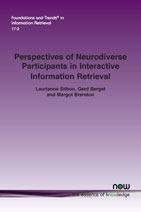Perspectives of Neurodiverse Participants in Interactive Information Retrieval
By Laurianne Sitbon, Queensland University of Technology, Australia, l.sitbon@qut.edu.au | Gerd Berget, Oslo Metropolitan University, Norway, gerd.berget@oslomet.no | Margot Brereton, Queensland University of Technology, Australia, m.brereton@qut.edu.au
Abstract
This monograph offers a survey of work to date to inform how interactions in information retrieval systems could afford inclusion of users who are neurodiverse. This existing work is positioned within a range of philosophies, frameworks and epistemologies which frame the importance of including neurodiverse users in all stages of research and development of Interactive Information Retrieval (IIR) systems. The monograph also offers examples and practical approaches to include neurodiverse users in IIR research, and explores the challenges ahead in the field.
Perspectives of Neurodiverse Participants in Interactive Information Retrieval
Perspectives of Neurodiverse Participants in Interactive Information Retrieval offers a survey of work to date to inform how interactions in information retrieval systems could afford inclusion of users who are neurodiverse. The existing work is positioned within a range of philosophies, frameworks, and epistemologies that frame the importance of including neurodiverse users in all stages of research and development of Interactive Information Retrieval (IIR) systems. The authors motivate the need for inclusive IIR to develop more broadly, and detail why assistive technologies are not sufficient to ensure inclusive access to information.
This survey is motivated by the authors’ desire to help transform IIR so that neurodiverse users can both inspire future research and benefit from innovation. This work is presented to students, researchers and practitioners in IIR with a view to provide both knowledge and inspiration towards more inclusive IIR approaches and systems. To that end, the survey contains an overview of each of the chapters to guide the reader to parts of the survey that may be most relevant to the work they are undertaking. The authors also offer examples and practical approaches to include neurodiverse users in IIR research, and explore the challenges ahead in the field.
